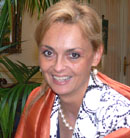Q & A with Polly Karastoyanova, Executive Director of the National Tourist Board of Bulgaria


Bulgaria’s travel industry has been putting good numbers on the board over the past couple of years, yet local authorities believe there’s still a long way to go in terms of service quality in a bid to draw far more tourists from Europe. That’s the opinion expressed by Polly Karastoyanova, Executive Director of the National Tourist Board of Bulgaria, in this exclusive interview with Caribbean News Digital.
Q.- What are the main goals and objectives of the National Tourist Board of Bulgaria?
A.- The National Tourist Board of Bulgaria is the largest non-governmental organization that represents the common interests of the big investors and stakeholders of the tourism industry. We have realized that we need that platform in order to present jointly to the government our objectives and achieve them jointly with the government because tourism is a joint venture between the private investors and the government. With that view in mind, the National Tourist Board has been established to work together with governmental institutions when there are some problems that need to be solved, but indeed it’s there to identify existing problems and act as an active part in the solution of those problems.
Q.- Bulgaria has changed a lot since the Communist era. How much do you think you have advanced in the field of tourism as one of the top income sources for the country?
A.- Tourism has been a booming industry for Bulgaria over the past two years and a lot of progress has been made. Right now, we may say the “hardware” is there, I mean the hotels and the facilities. What we are truly concerned about is the “software”, that is, the attractions and the services. That’s the one area we need to develop. At the National Tourist Board we’re focused on two directions. The first one is the general image of Bulgaria, the marketing brand for Bulgaria as a country, and secondly the tourism product we provide that will guarantee that such tourists as golfers, wine tasters, business travelers and ecological trippers could consider Bulgaria as a potential destination. Those tourists don’t come to the country only lured by attractive pictures, but when there’s a large network of services provided. That’s a key area we need to pour a lot of efforts into.
Q.- I know you’ve had contacts with Sol Melia executives. Have you considered the kind of investment and know-how that Spanish companies like Sol Melia could contribute to the development of Bulgaria’s travel industry?
A.- That’s true. We’ve invited Sol Melia to our forum, first of all because Sol Meliá is a worldwide brand, secondly because we’re in Madrid, and thirdly because we already have Sol Melia represented in Bulgaria and they have partnered with some members of the National Tourist Board’s Executive Committee. This is indeed a very good opportunity to present the experience of Sol Meliá to the audience. I must say that each and every international brand is more than welcome to Bulgaria because they actually bring added values to our destination.
Q.- What do you think is Bulgaria’s main advantage as a country when it comes to offering tourist products to visitors from the rest of Europe and the rest of the world?
A.- I believe Bulgaria’s cultural heritage represents a very wide sphere that has not been tapped into. Compared to the rest of the European nations, Bulgaria comes third, only after Italy and Greece, in terms of landmarks and important artifacts related to the treasures of the original civilizations. Unfortunately, this is an aspect that we haven’t exploited and I think that when it comes to branding, cultural heritage should be up front in that effort. But if we look at this issue from a different perspective, we must say that Bulgaria, as a modern destination is a very easy-to-reach location, very accessible. Flying to Bulgaria from a number of European capitals is no problem at all. Bulgaria is a very attractive weekend destination and due to its EU membership, the country is now holding a great number of business, economic and political events. So, this is a great opportunity for us to have a large number of business events and develop convention tourism.
In the best case scenario, Bulgaria’s future as a travel destination holds a number of opportunities in golf tourism, wine tourism, mountain climbing tourism, convention tourism, together with great cultural heritage.
Q.- The country also has very nice beaches, so you might be considering Bulgaria as a sun-and-beach destination as well.
A.- Correct. That’s not a very popular, a very well-known segment of the local tourism industry, not exactly the first idea of Bulgaria that comes to your mind, but as you mentioned, we have the natural preconditions, so that’s just another good idea that could be added to our portfolio.
Q.- For example, the Spanish tourists looking for sun-and-beach offers, Bulgaria is closer than the Caribbean.
A.- That’s true and as I mentioned somewhere at the beginning of this interview, if we happen to bring more sophistication to the logistics of what we do, the overall value of our tourism product will raise significantly.
Q.- If you’re going to receive massive turnouts of Western European tourists, do you think you need to raise the quality standards of the service to attract far more visitors and make them come back again?
A.- That’s critical to our development, I must say. Among the main issues that we’re discussing and aiming at are the development of infrastructure, the quality of service, and the need to increase the promotion, marketing and advertising of Bulgaria as a travel destination of choice.
Q.- Are you going to roll out a promotional and advertising campaign in Spain?
A.- I cannot say that’s going to happen right away, although we’d like to do it very much. We’re going to focus our efforts on securing significant increases in budget funds for the international advertising of Bulgaria. Once the money is there, then stepped-up promotional efforts in major markets like Spain and other countries will also be there to generate more attention and more tourist arrivals.














